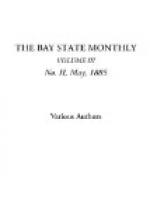After the war had begun, Governor Andrew insisted on every measure to defeat the Confederate armies that was consistent with the laws of war. He was especially strenuous in demanding the emancipation of the slaves, as the following quotation from a sketch by Mr. Albert G. Browne, Jr., the Governor’s military secretary, will show:—
“Over the bodies of our soldiers who were killed at Baltimore he had recorded a prayer that he might live to see the end of the war, and a vow that, so long as he should govern Massachusetts, and so far as Massachusetts could control the issue, it should not end without freeing every slave in America. He believed, at the first, in the policy of emancipation as a war measure. Finding that timid counsels controlled the government at Washington, and the then commander of the Army of the Potomac, so that there was no light in that quarter, he hailed the action of Fremont in Missouri in proclaiming freedom to the Western slaves. Through all the reverses which afterwards befell that officer he never varied from this friendship; and when at last Fremont retired from the Army of Virginia, the Governor offered him the command of a Massachusetts regiment, and vainly urged him to take the field again under our State flag. Just so, afterwards, he welcomed the similar action of Hunter in South Carolina, and wrote in his defence the famous letter in which he urged ‘to fire at the enemy’s magazine.’ He was deeply disappointed when the administration disavowed Hunter’s act, for he had hoped much from the personal friendship which was known to exist between the General and the President. Soon followed the great reverses of McClellan before Richmond.
“The feelings of the Governor at this time, on the subject of emancipation, are well expressed in a speech which he made on Aug. 10, 1862, at the Methodist camp-meeting on Martha’s Vineyard. It was the same speech in which occurs his remark since so often quoted:—
“’I know not what record of sin awaits me in the other world, but this I know, that I was never mean enough to despise any man because he was black.’
“Referring to slavery, he said:—
“’I have never believed it to be possible that this controversy should end and peace resume her sway until that dreadful iniquity has been trodden beneath our feet. I believe it cannot, and I have noticed, my friends (although I am not superstitious, I believe), that, from the day our government turned its back on the proclamation of General Hunter, the blessing of God has been withdrawn from our arms. We were marching on conquering and to conquer; post after post had fallen before our victorious arms; but since that day I have seen no such victories. But I have seen no discouragement. I bate not one jot of hope. I believe that God rules above, and that he will rule in the hearts of men, and that, either with our aid or against it, he has determined to let the people go. But the confidence I have in my own mind that the appointed hour has nearly come makes me feel all the more confidence in the certain and final triumph of our Union arms, because I do not believe that this great investment of Providence is to be wasted.’”




